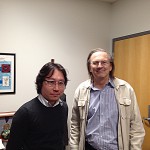ELSI Blog
35 Traveling A Lot at ELSI!

Since I arrived in ELSI, a lot of business trips have crowded into my schedule. The 1st of October, just after receiving my contract from the director, I traveled to Tomakomai-city in the northernmost island of Hokkaido, to attend an International Symposium on unnatural base pairs and amino acids (a very maniacally focused topic!) The symposium was well organized and successfully closed with aggressive discussion. After my Hokkaido trip, I went to Funabori-city, a part of Tokyo, to join a grant meeting and to present an interim report. Funabori is not far from ELSI, but still, I spent three days there. What made it particularly difficult was that these weeks were one of the biggest periods for grant application, called as Kakenhi, in Japan. Travel or not, this is a period when most researchers crazily rush around to finish a number of proposals (in my case, three). This is also a serious matter at ELSI because the institute does not support research costs, only providing salary and support of buildings. Therefore to secure National Grants is a crucial matter for us researchers. In terms of results, this was a good opportunity to reorganize my research ideas and to get valuable opinion from the people of the related areas. To survive this period is important for scientists.
The terrible October crunch passed quickly, with the next busy schedule waiting around the corner. From 4th to 7th of November, I went to Boston with Dr. Daisuke Kiga to have a meeting with Jack Szostak who is a Nobel Prize winner in 2009 in Physiology or Medicine. We spoke with him about the future research plans at ELSI and the possible route for development of the origin of life study. It was a wonderful opportunity to present my work and to hear his outlook on how life emerged in the early Earth. The meeting was about an hour but the content was valuable for the activity of ELSI and also for my research career. What is unfortunate was that I had caught a very bad cold just before leaving Japan for Boston. Actually, I confess here, I had a fever of more than 38-degrees and had carried our discussion with a bit of a foggy brain. I sincerely hope that my cold did not infect the Nobel Prize winner. I would not want that as one of my accomplishments. (I have attached a photo of me with Jack Szostak.)
Now I am basking in a period of temporary relaxation in my office but the next trip is soon coming up. I am scheduled to go to Tsuruoka, in the northern prefecture of Yamagata in Japan, to attend The Annual Meeting of the Japanese Society for Cell Synthesis Research. This meeting is unique and fascinating because the topic of focus is "How to create a cellular life?" There are many crazy and cool research that aim to figure out the essence of cellular life and the fundamental systems of a living matter. This kind of research field has been recently known as Synthetic Biology and some groups are attempting to construct synthetic cell or artificial cell in the laboratory. Although the studies of origin of life and synthetic cell seem to be situated at opposite directions in a time axis, the similarity of the two is that a cell may have the simplest form that consists of a minimal number of components. For this reason the study of synthetic cell is correlative to the study of the origin of life.
After that, there remains only one more trip in this year, which is a conference in Kobe-city in December. Then I can truly concentrate on my own experimental research in the lab. Through managing these busy days, I have mastered the Calendar App on my iPhone, which has come to my rescue many times. I would like to send my compliments to the smart technologies from California and to the computerized society.
Yutetsu Kuruma
12/11/2013











